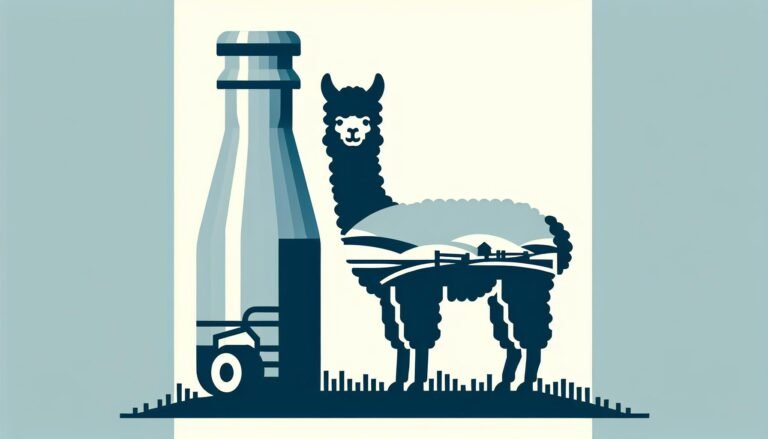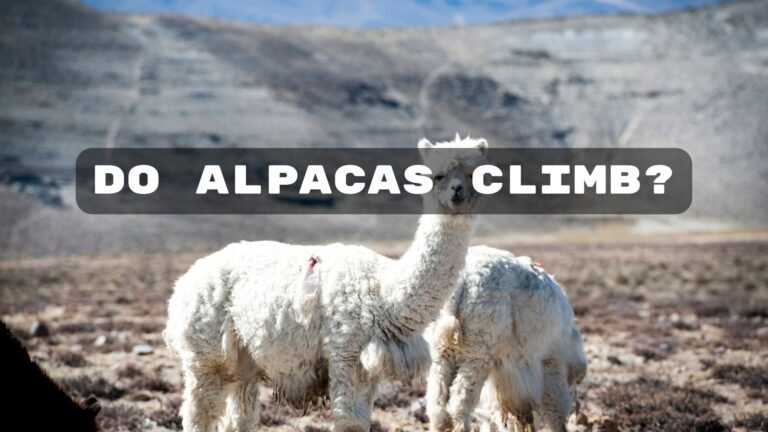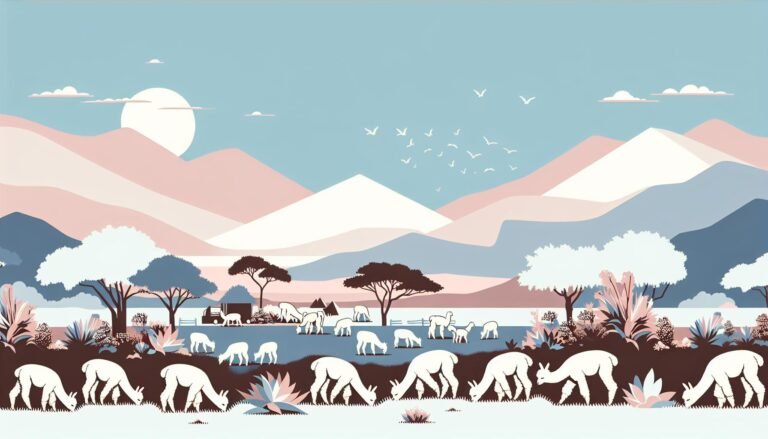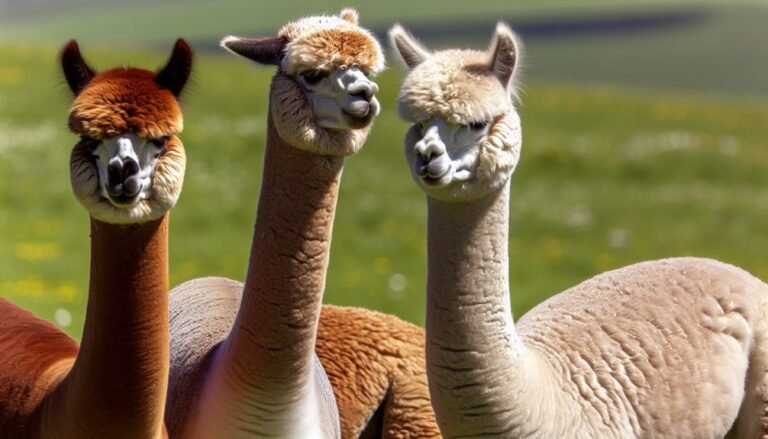Eco-Friendly Practices for Alpaca Fiber Production
If you want eco-friendly alpaca fiber, you’ll love that alpacas graze sustainably, protect soil, and need less water than other livestock. They emit half the methane of sheep, reducing greenhouse gases. Alpacas are treated humanely, sheared gently using traditional methods, and their fiber is processed with minimal chemicals. Plus, this supports indigenous communities and cuts textile waste with a biodegradable fiber. Keep exploring, and you’ll discover how these practices create a truly green textile choice.
Key Takeaways
- Alpacas are sustainably grazed to prevent overgrazing, protect soil health, and conserve water in harsh environments with minimal resource use.
- Annual shearing uses gentle, traditional methods that minimize stress and ensure humane treatment of alpacas.
- Alpaca fiber is processed without chemicals, preserving natural softness and antimicrobial properties while reducing environmental impact.
- Alpacas emit about 50% less methane than sheep, lowering greenhouse gas emissions and supporting sustainable farming.
- Fiber production supports indigenous communities by preserving traditional practices and promoting ethical, eco-friendly livelihoods.
Understanding Alpaca Fiber and Its Benefits

Alpaca fiber is a sustainable choice you might not have considered before. This renewable resource comes from shearing alpacas annually, making it a low-impact alternative to traditional fibers like wool or cotton. When you choose alpaca fiber, you’re supporting sustainable fashion with minimal environmental impact. The fiber is biodegradable, breaking down within a few years, which helps reduce landfill waste compared to synthetic fabrics. Plus, alpaca fleece has natural antimicrobial properties, so you won’t need to wash garments as often, conserving water and energy. Alpacas themselves contribute to a lower carbon footprint due to their efficient digestion and reduced methane emissions. By opting for alpaca fiber, you’re making eco-conscious choices that benefit both the planet and your wardrobe.
Sustainable Grazing and Land Management Practices
You’ll notice alpacas graze selectively, which helps protect soil by keeping plant roots intact and encourages healthy regrowth. Their gentle feet reduce soil compaction, preserving land and supporting diverse ecosystems. Plus, their natural waste enriches the soil, making sustainable land management easier to achieve.
Selective Grazing Benefits
Because they selectively graze only the necessary parts of plants, alpacas help maintain pasture health and biodiversity while preventing overgrazing. Their selective grazing supports sustainable land management by preserving root systems, which boosts soil health and encourages plant regeneration. You’ll also appreciate how alpacas produce natural fertilizer through their waste, enriching the soil without harmful chemicals. Plus, their padded feet reduce soil compaction, helping the land stay healthy and resilient. By choosing alpacas, you’re embracing an eco-friendly approach that conserves resources and nurtures the environment.
- Protects delicate ecosystems and promotes biodiversity
- Enhances soil fertility naturally, reducing chemical use
- Prevents erosion with gentle grazing habits
- Requires less land and water, conserving resources
- Supports long-term sustainable farming you can feel proud of
Soil Preservation Techniques
When managing land sustainably, it’s crucial to use grazing techniques that protect soil health and promote ecosystem balance. In alpaca farming, rotational grazing plays a key role in preserving soil integrity by preventing overuse of any single area. Alpacas’ selective grazing habits help maintain plant root systems, supporting soil structure and reducing erosion. Their padded feet also minimize soil compaction, which improves water retention and root growth. Additionally, alpaca waste acts as a natural fertilizer when left in communal dung piles, enriching the soil and boosting fertility. These practices not only sustain the soil but encourage biodiversity by allowing various plant species to thrive. By combining rotational grazing with careful land management, you can guarantee healthy pastures and long-term soil preservation in your alpaca farming operation.
Biodiversity Maintenance Strategies
Maintaining healthy soil sets the foundation for preserving biodiversity on your alpaca farm. Your alpacas’ selective grazing habits protect plant roots and prevent overgrazing, encouraging rich biodiversity. Their padded feet minimize soil compaction and erosion, safeguarding soil health. By practicing rotational grazing, you give pastures time to recover, promoting sustainable land management and a thriving ecosystem. Using alpaca waste as natural fertilizer further enriches your soil’s nutrients, supporting local flora and fauna.
- Protect fragile plant roots for continuous growth
- Rotate pastures to let the land breathe and heal
- Use alpaca waste to nourish your soil naturally
- Prevent soil erosion with gentle alpaca footsteps
- Foster diverse habitats that boost ecosystem resilience
These strategies help you maintain a vibrant, sustainable alpaca farm.
Water Conservation in Alpaca Farming
You’ll appreciate that alpacas need far less water than many traditional livestock, making them ideal for conserving this precious resource. Their grazing habits support sustainable irrigation by maintaining healthy pastures that require less watering. By choosing alpaca farming, you’re supporting a system that uses water efficiently and helps protect the environment.
Alpacas’ Low Water Needs
Because alpacas need far less water than sheep or goats, they’re ideal for farming in dry regions where water is scarce. Their low water needs mean you can raise alpacas sustainably without putting extra strain on limited water supplies. This makes alpaca farming a smart choice for conservation-minded farmers focused on reducing environmental impact. By choosing alpacas, you support sustainable practices that protect freshwater resources for the future.
- Alpacas drink only 2 to 3 gallons of water daily
- Thrive in harsh, arid environments
- Use water resources efficiently
- Produce less methane, lowering environmental impact
- Help conserve precious water reserves
With alpacas, you’re embracing eco-friendly fiber production that respects both the planet and its water.
Sustainable Irrigation Practices
Alpacas’ natural adaptation to dry environments means they thrive with minimal water, which sets the stage for sustainable irrigation practices on your farm. Since alpacas are adapted to arid conditions, you can rely on natural rainfall and limit artificial watering, promoting sustainable water management. Their selective grazing habits prevent overgrazing, which helps maintain soil health and reduces water runoff. This grazing behavior allows grasslands to retain moisture more effectively, supporting water conservation across your pastures. Additionally, managing communal dung piles enhances soil fertility and water retention, further benefiting moisture levels. By embracing these practices, you not only conserve water but also maintain a healthy ecosystem, making your alpaca fiber production eco-friendly and sustainable.
Minimizing Methane Emissions Through Alpaca Husbandry
When you choose alpacas for fiber production, you’re also opting for a livestock option that emits about 50% less methane than sheep. This makes alpaca husbandry a key element in sustainable farming, helping you reduce your operation’s carbon footprint. Their efficient digestive system produces fewer greenhouse gases, supporting eco-friendly agriculture. Plus, alpacas need less food and water, further minimizing methane emissions and resource use.
By raising alpacas, you:
- Cut down methane emissions considerably
- Promote climate change mitigation
- Use fewer resources like water and feed
- Support a more sustainable farming model
- Contribute to eco-friendly fiber production
Choosing alpacas means embracing a greener, cleaner future in fiber farming.
Ethical Animal Treatment and Welfare Standards

Reducing methane emissions is just one part of what makes alpaca fiber production eco-friendly. Ethical animal treatment plays an essential role, with humane treatment practices ensuring alpacas live in spacious, caring environments. Thanks to their natural resilience, alpacas thrive without needing many chemicals or pesticides, which supports a healthier ecosystem. You’ll find that sustainable harvesting methods, like annual shearing designed to minimize stress, protect the animals’ well-being while providing high-quality fiber. These ethical practices not only benefit the alpacas but also empower indigenous communities in South America, preserving traditional farming methods and promoting economic sustainability. By prioritizing welfare standards, you contribute to an eco-friendly system that respects both the animals and the people connected to alpaca fiber production.
Traditional and Eco-Friendly Shearing Techniques
Although shearing alpacas happens just once a year, it plays an essential role in eco-friendly fiber production. Using traditional shearing techniques like hand shears or electric clippers helps reduce energy use and supports sustainability. Alpacas are a renewable source of fleece, yielding 5 to 10 pounds annually without harm. You’ll find that proper shearing not only maintains fleece quality but also guarantees the ethical treatment of these animals by minimizing stress during the process.
- Gentle handling in familiar environments
- Non-invasive, stress-minimized shearing
- Energy-efficient manual or electric tools
- Annual fleece harvest without harm
- Enhances durability of alpaca wool products
Reducing Chemical Use in Fiber Processing
Since alpaca fiber is harvested without chemicals or pesticides, you’ll find it a much cleaner alternative to many other textile fibers. Unlike wool from sheep, which often involves chemical treatments during processing, alpaca fiber requires minimal intervention. Its natural antimicrobial properties mean you don’t need to wash it as frequently, reducing detergent and chemical use. This makes alpaca fiber an eco-friendly choice for natural fibers. The processing typically avoids harsh chemicals, preserving the fiber’s softness and strength while supporting sustainable practices. By choosing alpaca fiber, you’re supporting a production method that prioritizes the environment by minimizing chemical inputs, unlike conventional wool production. This reduction in chemicals helps protect ecosystems and promotes a cleaner, greener textile industry.
The Role of Alpaca Fiber in Reducing Textile Waste

Alpaca fiber’s minimal chemical processing is just one way it supports a greener textile industry. By choosing natural fibers like alpaca, you’re actively reducing the need for synthetic materials that linger in landfills for centuries. Its long-lasting durability means fewer replacements, cutting down on textile waste. Plus, alpaca wool’s natural moisture-wicking and odor-resistant traits mean you can wash garments less often, conserving water and energy.
- Biodegradable and compostable within 1-5 years
- Durable fibers that outlast fast fashion
- Harvested annually without harming animals
- Requires minimal chemical use in production
- Reduces overall environmental impact of textiles
Supporting Indigenous Communities Through Sustainable Alpaca Farming
When you support sustainable alpaca farming, you’re helping indigenous communities in the Peruvian Andes maintain their livelihoods and preserve age-old farming traditions. These family-run farms rely on traditional farming techniques passed down through generations, promoting ethical practices that protect cultural heritage. By choosing alpaca fiber produced sustainably, you contribute to community development by creating jobs in rural areas and reducing urban migration. Practices like communal dung piles not only improve soil health but also foster cooperation among local farmers, strengthening community bonds. Your support guarantees profits stay within these indigenous communities rather than flowing to large corporations, empowering them economically while preserving their unique knowledge of sustainable agriculture. Sustainable alpaca farming is more than eco-friendly—it’s a crucial lifeline for these communities.
Frequently Asked Questions
Is Alpaca Fiber Sustainable?
You won’t find a fiber with less environmental impact than alpaca’s—sustainable farming meets renewable resources here. Unlike harsh methods, fiber production respects animal welfare, blending tradition with eco-conscious care for a truly sustainable choice.
What Is the Most Eco-Friendly Fiber?
When comparing natural fibers, you’ll find eco friendly textiles like alpaca stand out in sustainable fashion trends due to organic fiber benefits. An environmental impact assessment shows alpaca fiber has a lower footprint than many others.
Is Alpaca Yarn Cruelty-Free?
You couldn’t find a more ethical yarn if you tried—ethical alpaca farming guarantees top animal welfare standards, humane shearing practices, strict alpaca breeding ethics, and fiber sourcing transparency, making alpaca yarn genuinely cruelty-free every step of the way.
Can Vegans Wear Alpaca Wool?
You might struggle with ethical considerations wearing alpaca wool since it involves animal welfare and fiber sourcing. If you prioritize sustainable fashion, consider vegan alternatives that align better with your values and avoid animal-derived materials altogether.








Our picks
Alpaca & Wool Felted Sole Inserts: Comfy Upgrade?
Best Alpaca Socks for Hiking: Ultimate Comfort and Durability on Trails
Best Alpaca Halter for Comfort and Control